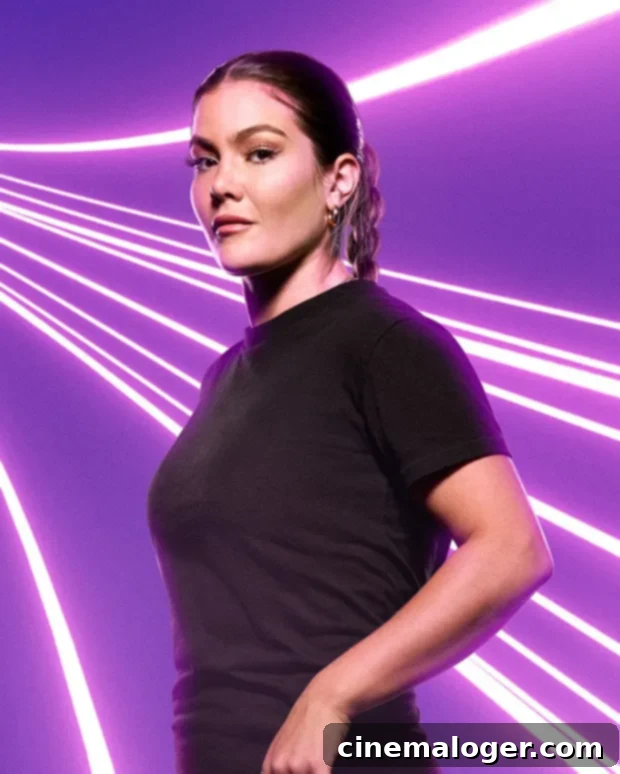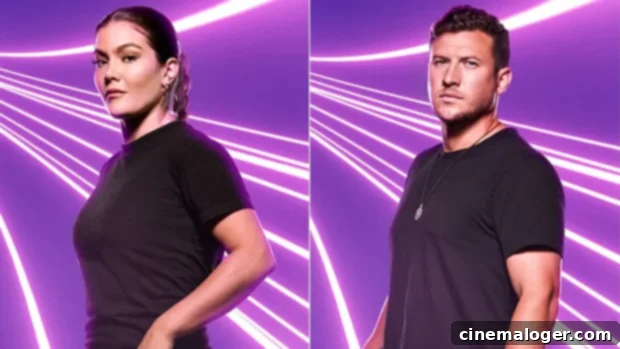Exclusive: Tori Deal & Devin Walker Unpack Their ‘Challenge: Ride Or Dies’ Victory and Unseen Final Moments
In a thrilling conclusion to one of MTV’s most intense seasons, Tori Deal and Devin Walker officially cemented their legendary status as champions of The Challenge: Ride Or Dies. Their hard-fought victory saw them outlast formidable competitors, including veteran duo Johnny “Bananas” Devenanzio and Nany Gonzalez, who secured second place, and the equally tough pair of Jordan Wiseley and Aneesa Ferreira, who finished third. Tori and Devin’s journey through the arduous 100-hour final was marked by their exceptional teamwork and strategic prowess, often dominating many segments of the race. However, as viewers learned, their significant leads didn’t always translate directly into an overall advantage, as the clock was notably reset with each major segment, adding an unpredictable layer to an already demanding competition.
Navigating the Reset Clock: A Double-Edged Sword
The unique format of The Challenge: Ride Or Dies final, particularly the clock reset after each segment, presented a strategic conundrum for the competitors. Devin Walker candidly shared his perspective with HollywoodLife in an EXCLUSIVE interview, describing it as a “double-edged sword.” He elaborated on how this mechanism could either be a source of frustration or a strategic relief, depending on one’s psychological approach.
“That was a double-edged sword,” Devin admitted. “Depending on your mindset, you could be a little salty that you won one day by three hours, but then you only get a 90-second head start the next day. That’s if you choose to be a pessimist.” However, Devin quickly clarified that both he and Tori embody a more optimistic outlook, viewing the situation as a glass-half-full scenario. This positive mindset proved crucial in maintaining their focus and morale throughout the grueling final.
Devin explained the underlying security this format offered them: “To me, it was relieving in a sense that if there does happen to be an event that isn’t in our wheelhouse, we’re not out of the race. So it was just that security, in combination with dominating all the checkpoints.” Their impressive performance, winning an astounding 11 out of 12 checkpoints, further bolstered their confidence. This consistent excellence meant that even with resets, their overall strength was undeniable. “I was like, you know what, don’t even give us a lead! You want us to beat them in everything straight up? Sure thing!” he recalled, reflecting on their competitive spirit. He concluded that while initially “annoying for 30 seconds,” the realization that they were “never out of the race” ultimately made the clock reset a significant benefit, reinforcing their strategic position and mental resilience.
Comparing Finals: The Most Mentally Grueling Experience
When asked how this final stacked up against their previous experiences on The Challenge, both Tori and Devin agreed it was exceptionally brutal, particularly on a mental level. Devin highlighted the intense physical and emotional toll it took on the competitors from the very beginning.
(DEVIN) – “I think it was the most difficult that I’ve been part of. It was definitely the most mentally grueling. The first day was very difficult. We saw Nany injure her knee, Olivia [Kaiser] legitimately almost died, Aneesa twists her ankle. That’s all inside the first 18 hours of this final. It was a lot.” These early incidents underscored the extreme demands of the competition, demonstrating how quickly things could go wrong even for seasoned Challengers. Amidst such chaos and physical breakdowns, Devin credits their partnership’s ability to remain focused on crucial details. “One of the things that we always came back to as a duo is that in the moments of panic and exhaustion, pay attention to the details. Keep your mind on the race. We were able to do that.” This unwavering focus on strategy and execution, even when surrounded by injuries and fatigue, was a hallmark of their winning performance.

The Hardest Part: The Relentless Mental Strain of Anticipation
While the physical challenges of a Challenge final are undeniable, Tori and Devin both emphasized that the mental stress, particularly the relentless anticipation of what was coming next, was arguably the most difficult aspect. Tori articulated how this mental burden, often understated in televised edits, became a constant companion throughout the 100-hour ordeal.
(TORI) – “For me, it was the mental stress of what’s coming next. We’ve been tested. We know our bodies can do it and we know we’re capable. But the thing that really made this difficult in a 100-hour final — and what, I think, is not portrayed accurately on TV — is that the off-time was a lot of, ‘What’s coming next? How am I going to do this?’ It’s just a lot of anxiety and stress and pressure.” This constant psychological battle, coupled with the harsh realities of living in the wilderness, amplified the challenge. Tori recalled the discomfort of being “sweaty in your tent after not showering every single night,” equating this mental and environmental toll to the physical exertion of the competition itself. For her, the unseen psychological warfare was just as demanding.
(DEVIN) – “That’s a really good point. The anticipation of the next chapter is almost as difficult, or honestly harder, often, than what the next chapter ends up being.” Devin further illustrated this concept by drawing a relatable analogy to everyday work life: “I want people to think about this in terms of their own job. If your boss came in and said, ‘Your final review is coming up and you need to be ready at ANY MOMENT. I’m going to literally knock on your door no matter where you are and you’re going to have to do it at that moment.’” This constant state of readiness, the perpetual “being ON,” as Devin described it, is a unique strain of The Challenge. It’s not merely about performing well during a task, but about the preparedness required for a surprise summons from TJ Lavin. “It’s literally just TJ [Lavin] rolling up on an ATV and saying, ‘Put your shoes on, we’re leaving right now.’ That’s actually how it is. You have to be ready at all points and that’s very difficult.” And, of course, adding a touch of classic Challenge nastiness, Devin couldn’t resist adding a memorable, albeit unpleasant, detail: “Also, drinking the fish guts was not fun.” This vividly paints a picture of the combined mental and physical discomfort that permeated their experience.
Unseen Moments: The Hidden Trials of The Final
While viewers witness the highlights of The Challenge finals, much of the grueling reality remains off-screen. Tori and Devin pulled back the curtain on some of these unseen moments, offering a deeper understanding of the comprehensive nature of the 100-hour ordeal.
(TORI) – “The first day was a lot of running. We probably did, like, a half marathon. After that, I don’t even know how much we ended up doing in total. You would basically be doing something all day.” Beyond the visible endurance tests, Tori revealed that two “very interesting” checkpoints were ultimately cut from the final broadcast. These included a demanding task where competitors “had to balance in a picture frame for a long period of time” and another requiring them to “hold up a block for a really long time.” These excised segments further underscore the sheer volume and variety of physical and mental endurance tests embedded within the final, illustrating that what viewers see is often just a fraction of the full story.
The “off-time” at camp, far from being a period of rest, was often a different kind of challenge. Tori described the environmental stressors and the psychological anticipation that filled these moments. “In the off-time, once we got to camp, we knew we were going to bed, but in the morning, we’d wake up because there were these treacherous parakeets that would start screaming at 6:00 a.m. Then you’d see production cars show up an hour after that, and then the anxiety really starts to kick in.” This routine, far from relaxing, simply shifted the mental battleground. Sometimes, they would endure “a few more hours” of anxious waiting, while other times they were “up and out” immediately. This unpredictable rhythm contributed significantly to the mental fatigue, as contestants could never truly relax or predict their next move.
The Strategic Decision to Share the Prize Money
One of the most talked-about moments after their victory was Tori and Devin’s decision to share a portion of their prize money with the other three finalist teams. This gesture, rooted deeply in their long-standing relationships and strategic approach to the game, was not a spontaneous act but a reflection of their core gameplay philosophy.
(TORI) – “We really just banked on our friendships this whole game. We’ve played this game so much and with so many people that we know and that carried us really far. Ultimately that led to why we shared the money at the end. You don’t succeed if you don’t work with people.” Tori emphasized the vital role of alliances and genuine connections throughout the season. These relationships were not just for gameplay but were built on years of shared experiences, creating a web of trust that benefited them significantly. The decision to share the prize money was a tangible way of acknowledging the collective effort and the bonds that helped them reach the final stage.

Tori recounted the moment the idea solidified during the final elimination stage. “A lot of people don’t realize that that final elimination ended up being 5-6 hours long. By the time we were in the chain room, Nany and Bananas were still outside working on their puzzle, and we realized we were at least an hour in front of them. There wasn’t a way for them to really catch up.” As victory became inevitable, the conversation naturally turned to the prize. “In that room it’s kind of hitting me. I’m like…this is about to happen. I look at Devin and I’m like, ‘So are we going to split the money?’ and he’s like ‘This is not the time!’ So we shut it down.” The pragmatism of the moment quickly gave way to the celebratory aftermath. “But then two seconds after we pulled the lever and hugged and celebrated, that was the next conversation.”
Their decision was also influenced by past experiences and a sense of collective sportsmanship. “There is a sense of gratitude of winning around so many people who had an incredible season. These are people who are incredible, and we had to win in front of them.” Tori highlighted the awkwardness of being the sole jubilant team on the bus ride back, contrasting it with the positive feeling they experienced when they themselves had benefited from a similar gesture. “Imagine the whole bus ride back if we were the only ones in a good mood? We won $50,000 last season because Kaycee [Clark] and CT [Tamburello] split it, we know how that felt. It felt f***ing great. So why not continue that? Devin and I both agreed on that equally.” This act of generosity wasn’t just about sharing wealth but about fostering goodwill, acknowledging the journey, and upholding a tradition of mutual respect among Challengers.
(DEVIN) – In a lighter, but characteristic, interjection, Devin added: “I also want to add that I asked TJ if I could give Johnny’s $38,000 to Sarah [Rice] and he said no!” This humorous remark harks back to Bananas’ infamous decision to keep all the prize money from Rivals III, adding a playful jab while underscoring Devin’s unique sense of humor and historical awareness within The Challenge lore.
The Power of the Political Game: Alliances and Honesty
Beyond physical prowess, The Challenge is a deeply strategic game, where social and political maneuvering often dictates survival. Both Tori and Devin firmly believe that strong relationships and honesty are paramount to success, a philosophy that guided their entire season.
(DEVIN) – “There’s no way you get through this game on your own. Some people think that they can and they don’t value the importance of relationships and honesty. I can assure everybody that I played this game with that I had my full focus on keeping them in the game unless it was one of them against the other and I had to make a strategic move based on that. Or if it was me or them. That’s just always the way both of us have played the game.” Devin’s assertion highlights a nuanced approach: loyalty is key, but strategic decisions must be made when allegiances clash or personal survival is at stake. This blend of trust and calculated strategy allowed them to navigate the volatile social landscape of the game effectively.
Their political acumen translated directly into tangible advantages. “We managed to stay out of elimination, not because we were lying or doing anything like that, but because we aligned ourselves with the best pairs.” Devin pointed out a crucial observation: the daily challenges were consistently won by the strongest pairs, and by aligning with these high-performing teams, who also happened to be their friends, they created a powerful, insulated bloc. “When you run down the list of pairs who won daily challenges, they were all the best pairs. The pairs that weren’t winning, we didn’t have to worry that we weren’t working with them. We aligned ourselves, as a strong team, with the other strong teams, who also happened to be our friends because we’ve played with them before.” This strategy minimized their exposure to elimination rounds, allowing them to conserve energy and focus on the overall competition, a testament to the power of a well-executed political game.
What’s Next for the Champions? Returning to The Challenge
Having achieved the ultimate victory, the natural question arises: will Tori Deal and Devin Walker return to compete on The Challenge again? Their responses, while cautious, suggest a strong possibility for future appearances, albeit with some introspection.
(TORI) – “To be continued…we’ll see. I mean…probably..but we’ll see.” Tori’s playful reticence hints at the allure of the game combined with a desire to savor their current triumph. While she admits a return is “probably” likely, the decision is often complex, involving timing, personal commitments, and the casting process itself.
(DEVIN) – Devin, ever the charismatic competitor, couldn’t resist a moment of playful bravado. “I’m not going to even flex, I only have 7 to go now until I’m the G.O.A.T! I’m just putting some tallies in this thing!” This cheeky reference to his aspiration of surpassing the legendary Johnny Bananas’ record for most wins showcases his enduring competitive spirit. However, he quickly shifted to a more serious reflection on the profound impact of this win. “In all seriousness, though, it will be a heavy decision just because this is something I’ve wanted for so long and it does really complete a piece of my puzzle.” For Devin, this victory is more than just a trophy; it’s the culmination of years of dedication and strategic play, fulfilling a significant personal ambition.
Ultimately, the decision isn’t solely theirs. “This is also out of both of our hands, we don’t do the casting.” Despite this, Devin’s competitive drive remains strong. “But if given the opportunity to play again, I will very likely play again and very likely win again.” Both Tori and Devin have proven themselves not only as dominant physical competitors but also as masterful strategists and social players. Their victory on The Challenge: Ride Or Dies stands as a testament to their evolution within the game, and their future on the show, while uncertain, is undoubtedly eagerly anticipated by fans.
